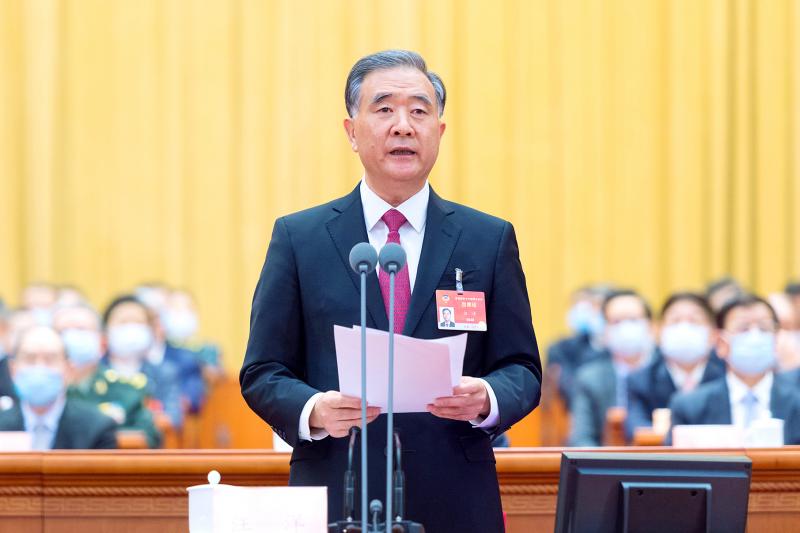The so-called “democratic consultation” is a tactic China uses to cheat Taiwanese into accepting its “one country, two systems” policy and destroy Taiwan, the Mainland Affairs Council (MAC) said yesterday, adding that the government would not agree to such a proposal.
The consultation proposal was first advocated by Chinese President Xi Jinping (習近平) in a 2019 speech to commemorate the 40th anniversary of the “Message to Compatriots in Taiwan.”
The “democratic consultation” should be conducted through representatives recommended by political parties and all sectors on both sides of the Taiwan Strait, and proceed on the common political foundation of upholding the “1992 consensus” and opposing Taiwan independence, Xi said.

Photo: China News Service via CNA
Chinese People’s Political Consultative Conference Chairman Wang Yang (汪洋) reiterated the proposal in his meeting with former Chinese Nationalist Party (KMT) chairwoman Hung Hsiu-chu (洪秀柱) on Saturday.
In response, the council said that Beijing is using the Winter Olympics to form a united front and spread political propaganda.
“It is also using meetings with Taiwanese politicians to promote its erroneous ‘one China’ principle and deceptive ‘democratic consultation,’ through which it attempts to reach the goal of ‘one country, two systems,’” the council said, adding that “the government is strongly against this proposal.”
“The public in Taiwan has never accepted China’s policy of belittling and attacking Taiwan and its proposed direction of cross-strait relations. Beijing does not have the right to comment or intervene in Taiwan’s future,” the council said.
People participating in cross-strait exchange events should beware of Chinese political operatives and adhere to regulations governing those exchanges, the council said, adding that they should uphold Taiwan’s national interests by not participating in “democratic consultations.”
A source within the Chinese Nationalist Party (KMT) said Taiwan and China lack the grounds to talk about unification or “democratic consultations” at this moment, adding that Taiwan is not capable of declaring independence either.
“To us, ‘one China’ means the Republic of China [Taiwan], we oppose any action that would hurt Taiwan’s sovereignty,” the KMT source said.
The “1992 consensus” — a term that former Mainland Affairs Council chairman Su Chi (蘇起) in 2006 admitted making up in 2000 — refers to a tacit understanding between the KMT and the Chinese Communist Party that both sides of the Taiwan Strait acknowledge that there is “one China,” with each side having its own interpretation of what “China” means.
Additional reporting by Chen Yun

EUROPEAN TARGETS: The planned Munich center would support TSMC’s European customers to design high-performance, energy-efficient chips, an executive said Taiwan Semiconductor Manufacturing Co (TSMC, 台積電), the world’s largest contract chipmaker, yesterday said that it plans to launch a new research-and-development (R&D) center in Munich, Germany, next quarter to assist customers with chip design. TSMC Europe president Paul de Bot made the announcement during a technology symposium in Amsterdam on Tuesday, the chipmaker said. The new Munich center would be the firm’s first chip designing center in Europe, it said. The chipmaker has set up a major R&D center at its base of operations in Hsinchu and plans to create a new one in the US to provide services for major US customers,

The Ministry of Transportation and Communications yesterday said that it would redesign the written portion of the driver’s license exam to make it more rigorous. “We hope that the exam can assess drivers’ understanding of traffic rules, particularly those who take the driver’s license test for the first time. In the past, drivers only needed to cram a book of test questions to pass the written exam,” Minister of Transportation and Communications Chen Shih-kai (陳世凱) told a news conference at the Taoyuan Motor Vehicle Office. “In the future, they would not be able to pass the test unless they study traffic regulations

GAINING STEAM: The scheme initially failed to gather much attention, with only 188 cards issued in its first year, but gained popularity amid the COVID-19 pandemic Applications for the Employment Gold Card have increased in the past few years, with the card having been issued to a total of 13,191 people from 101 countries since its introduction in 2018, the National Development Council (NDC) said yesterday. Those who have received the card have included celebrities, such as former NBA star Dwight Howard and Australian-South Korean cheerleader Dahye Lee, the NDC said. The four-in-one Employment Gold Card combines a work permit, resident visa, Alien Resident Certificate (ARC) and re-entry permit. It was first introduced in February 2018 through the Act Governing Recruitment and Employment of Foreign Professionals (外國專業人才延攬及雇用法),

‘A SURVIVAL QUESTION’: US officials have been urging the opposition KMT and TPP not to block defense spending, especially the special defense budget, an official said The US plans to ramp up weapons sales to Taiwan to a level exceeding US President Donald Trump’s first term as part of an effort to deter China as it intensifies military pressure on the nation, two US officials said on condition of anonymity. If US arms sales do accelerate, it could ease worries about the extent of Trump’s commitment to Taiwan. It would also add new friction to the tense US-China relationship. The officials said they expect US approvals for weapons sales to Taiwan over the next four years to surpass those in Trump’s first term, with one of them saying